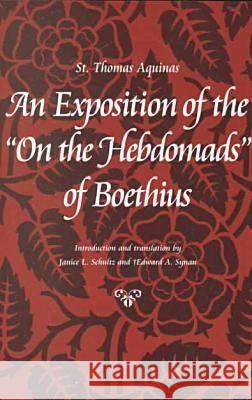An Exposition of the on the Hebdomads of Boethius » książka
An Exposition of the on the Hebdomads of Boethius
ISBN-13: 9780813209951 / Angielski / Miękka / 2001 / 132 str.
In his sixth-century work commonly known as the De hebdomadibus, Boethius (ca. 480-524) poses the question of how created things or substances can be good just as they are - that is, good just by existing - without being the same as the source of all goodness, God, who is understood to be Goodness Itself. In his commentary written in the thirteenth century, St. Thomas Aquinas sets out to explain the problem Boethius is treating as well as to explicate Boethius's solution. In doing so, however, the Angelic Doctor suggests a more developed analysis of goodness, based on his own metaphysical perspective. Still, his view can be seen to continue the emphasis Boethius himself placed on the notion of creation - bringing into being - as crucial to understanding the issues at hand. The introduction to this translation provides critical historical background, including an account of the influence of Cicero and Augustine, for understanding Boethius's view of being, or esse. Based on historical and textual analysis, the authors reaffirm the traditional interpretation, which holds that for Boethius esse indicates form rather than a distinct act of being. In articulating the difference between











